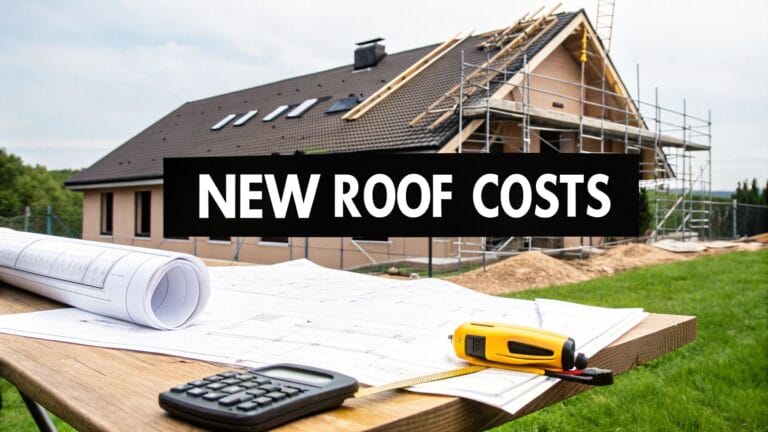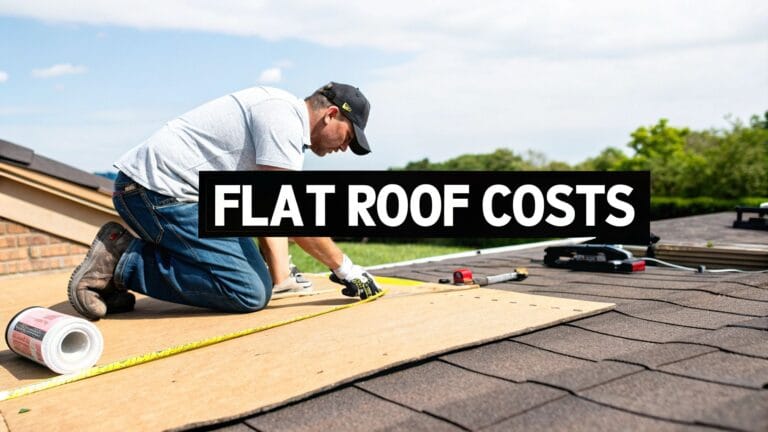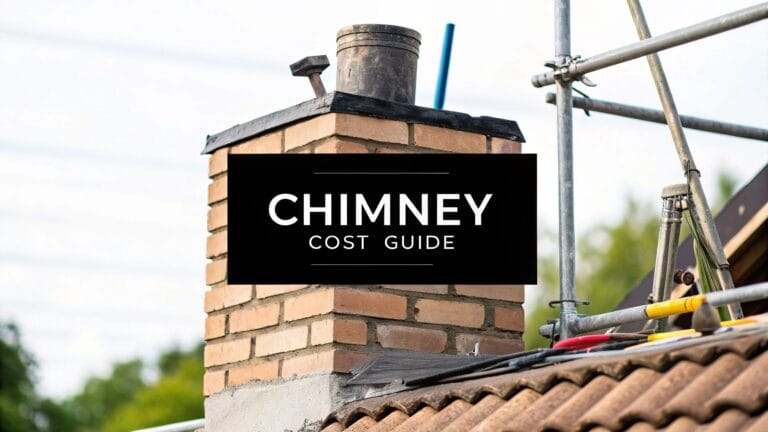
New Roof Cost in the UK: A Practical 2024 Guide
Learn about the factors influencing new roof cost in the UK. Get tips to budget effectively for your roof replacement today!
Figuring out the cost of a new roof can feel a bit daunting, but for most UK homes, a full replacement will typically fall somewhere between £4,000 and £19,000. The final figure on your quote really boils down to the specifics of your house, the materials you go for, and even where you live. This guide is here to break it all down and give you a clear picture of where that money goes.
Your Guide to UK New Roof Costs
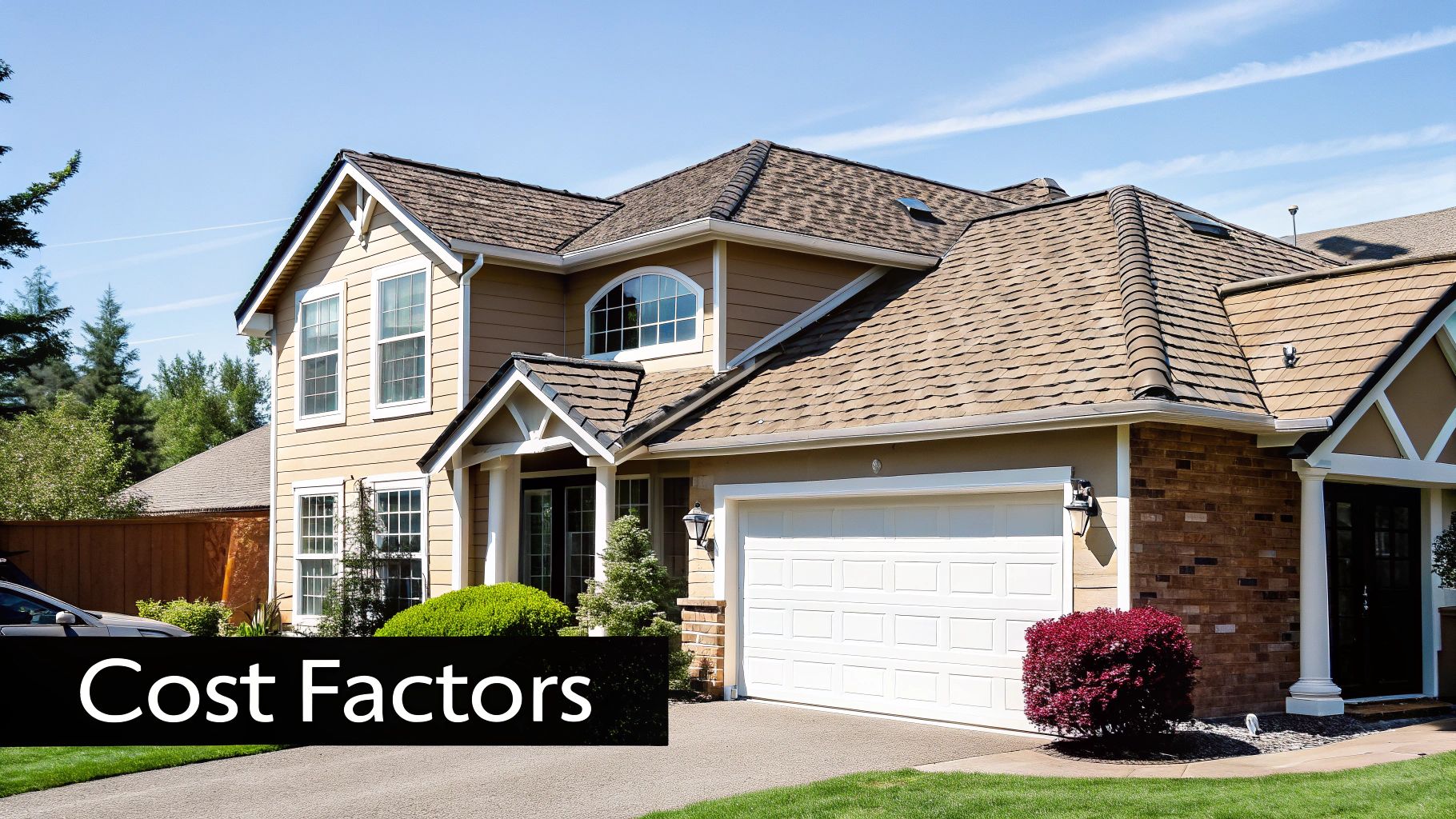
Putting a new roof on your home is one of the biggest investments you'll make as a homeowner. It's far more than a simple repair; it's a vital upgrade that safeguards your entire property, can make your home more energy-efficient, and definitely boosts its kerb appeal and value. But let's be honest, the first question everyone asks is: "How much is this going to cost?"
Getting a handle on the potential new roof cost right from the start helps you plan your budget and make smarter decisions. Think of it as creating a roadmap for the project. When you know the likely destination (the final cost), the journey of picking out materials and finding the right contractor becomes a whole lot less stressful.
At a Glance: New Roof Costs by Type
To give you a quick reference, we've put together a table summarising the typical costs for different roofing materials. This should help you see where your project might land based on the type of roof you're considering.
| Roof Type | Average Cost Range | Average Cost per m² |
|---|---|---|
| Felt Flat Roof | £1,500 – £4,000 | £50 – £90 |
| EPDM Rubber Flat Roof | £2,000 – £5,000 | £80 – £120 |
| GRP Fibreglass Flat Roof | £2,500 – £6,000 | £90 – £130 |
| Concrete Tile Pitched Roof | £5,000 – £12,000 | £90 – £170 |
| Slate Tile Pitched Roof | £8,000 – £19,000+ | £120 – £250 |
Remember, these are ballpark figures. The final cost will always depend on the unique factors of your property, like its size and the complexity of the job.
A Practical Look at Average Costs
While every roof has its own quirks, looking at typical figures gives us a solid starting point. Recent industry data suggests the average new roof cost in the UK hovers around £7,000. Of course, this is just a benchmark.
A smaller, straightforward job using budget-friendly materials might only set you back £4,000. On the other end of the scale, a large, complex roof on a period property using premium natural slate could easily push the cost closer to £19,000. These figures nearly always include the whole package: materials, skilled labour, scaffolding hire, and the proper disposal of old materials.
So, why the huge range? It’s because several key factors directly influence the final quote you receive.
- The size and complexity of your roof: It stands to reason that a simple, small roof costs less than a large, intricate one with lots of hips, valleys, and dormer windows.
- The materials you choose: Standard concrete tiles, classic natural slate, and modern GRP fibreglass systems all come with very different price tags.
- Your property’s location: Labour rates and even material supply costs can vary quite a bit between London, the Southeast, and other parts of the UK.
- The state of the roof structure underneath: If the old felt needs replacing or any roof timbers are found to be rotten, those repairs will add to the overall cost.
Our Transparent Approach to Your Quote
At Evershield Roofing, we believe in being completely upfront about costs. We don’t just throw a number at you; we provide a detailed, itemised quote so you can see exactly what you're paying for, line by line.
Our process always kicks off with a thorough, no-obligation inspection of your current roof. This lets us properly assess every detail, from its structural integrity to the best and most cost-effective materials for your home. We break down the costs for materials, labour, and any extras like scaffolding, so you can make an informed decision with complete confidence.
By understanding the factors that shape your new roof cost, you're in a much better position to choose the right solution for your home and your budget. For a more detailed breakdown, you can explore our full guide to the average cost for a new roof. This will walk you through all the specifics, ensuring you have the complete picture before you commit.
What Really Drives Your Roofing Quote
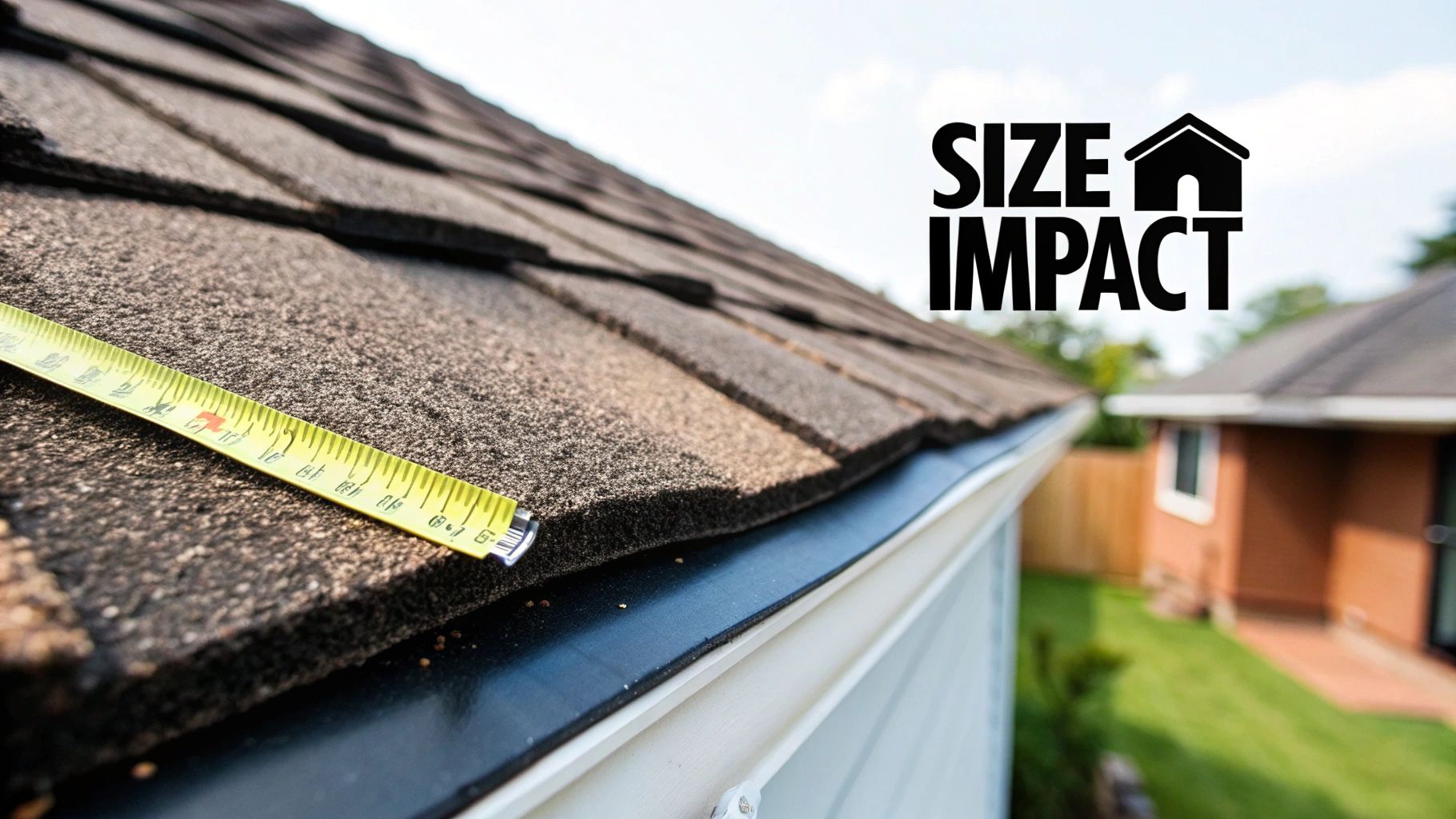
When you get a quote for a new roof, it can feel like a lot of numbers. But what's really behind them? Think of it like a recipe: the final price comes down to the quality of the ingredients and how complex the dish is to make. While your choice of tiles or slates is a big part of it, the real drivers of the cost are the roof itself—its size and shape—how easy it is for us to work on, and the condition of the structure underneath.
These factors explain the 'why' behind the price. A small, simple roof is one thing; a large, complex one with tricky access is another entirely, demanding more time, more materials, and more skilled work. Let's break down exactly what shapes your final quote.
Your Roof’s Size and Shape
The biggest single factor influencing the cost is, quite simply, your roof. A small, square bungalow roof is straightforward. It’s like painting a single, flat wall – predictable and relatively quick.
But a large, steep roof on an older house with dormer windows, valleys, and a chimney? That’s a completely different job. It’s more like decorating an entire ornate room. This kind of complexity changes things significantly:
- More Materials: A bigger roof naturally needs more tiles, more underlay, and more timber battens. Simple as that.
- Specialised Labour: Tricky areas like valleys (where two roof sections meet at an angle) or fitting around dormers demand a high level of skill. It takes far more time to cut and seal these areas properly than it does to lay tiles on a straight run.
- Increased Waste: Making all those custom cuts for a complex shape inevitably creates more offcuts. This waste has to be accounted for in the material order.
The pitch, or steepness, of your roof also makes a huge difference. Working on a very steep roof is slower and more hazardous. It almost always requires more complex scaffolding and extra safety gear, which adds directly to the labour costs.
Site Accessibility Challenges
Next, we have to consider how easily we can get to your roof. Is your house a detached property with a big drive, or a terraced home wedged onto a busy main road?
The logistics are a major part of any roofing project. A clear driveway means we can park a skip and our vans right next to the house. But for a home on a tight street, we might need to get council permits to close a lane, erect scaffolding over a public footpath, and carry every single tile and all the waste by hand.
These access issues add time, admin, and labour to the job. A project that’s difficult to access will simply take longer, and that's reflected in the final cost. It's one of the first things we look at during our free survey.
The Unseen Structural Condition
Finally, there’s what lies beneath. The condition of the hidden timber structure – the rafters, joists, and sarking boards – is the true foundation of your roof. We can only see what’s really going on once the old covering comes off.
Sometimes, we uncover issues that need sorting. Common problems include:
- Timber Rot: Years of a slow, unnoticed leak or poor ventilation can lead to rotten timbers, which are structurally unsafe.
- Damaged Underfelt: Old felt is often torn, brittle, or not breathable. It will need replacing with a modern membrane to prevent condensation and protect the structure.
- Insect Infestation: Woodworm can quietly weaken the timber frame over many years.
Here at Evershield Roofing, we never cut corners on the structure. If we find a problem, we stop, show you exactly what’s wrong, and give you a clear, separate quote for the repair. Fixing these issues is essential for a safe, long-lasting roof. While it can add to the initial budget, it’s the only way to guarantee the entire system will be sound for decades to come.
Choosing Your Roofing Materials
The material you choose is arguably the single biggest factor influencing the cost of your new roof. But it’s not just about the initial outlay; it also dictates how your roof will perform and look for decades to come. Think of it as the foundation of the whole project – getting it right is crucial.
It’s a bit like buying a new winter coat. You could grab a cheap, lightweight jacket that does the job for a season. Or, you could invest a bit more in a high-quality, weatherproof coat that will keep you warm, dry, and looking good for years. Your roof is exactly the same. A slightly higher investment now can mean far fewer headaches and repair bills down the line.
Popular Pitched Roofing Materials
For the classic sloped roofs we see on most UK homes, you have a few fantastic options. Each offers its own unique blend of cost, durability, and style.
- Concrete Tiles: A real workhorse of the roofing world, concrete tiles are incredibly popular for a reason. They're durable, come in a huge range of styles and colours (often mimicking more expensive materials), and offer a solid lifespan of around 30-50 years. A brilliant, budget-conscious choice.
- Clay Tiles: If you’re after a more traditional, rustic charm, clay tiles are hard to beat. They have beautiful warm, earthy tones that only get better with age. They do cost a little more than concrete, but you can expect them to last for 50-60 years, sometimes even longer.
- Natural Slate: This is the premium choice. Natural slate provides a timeless, elegant look that nothing else can quite replicate, and its lifespan is phenomenal—often well over 100 years. While it does have the highest initial cost, its incredible durability and classic appearance can add serious value to your property.
Here's a quick visual guide to how these material costs stack up.
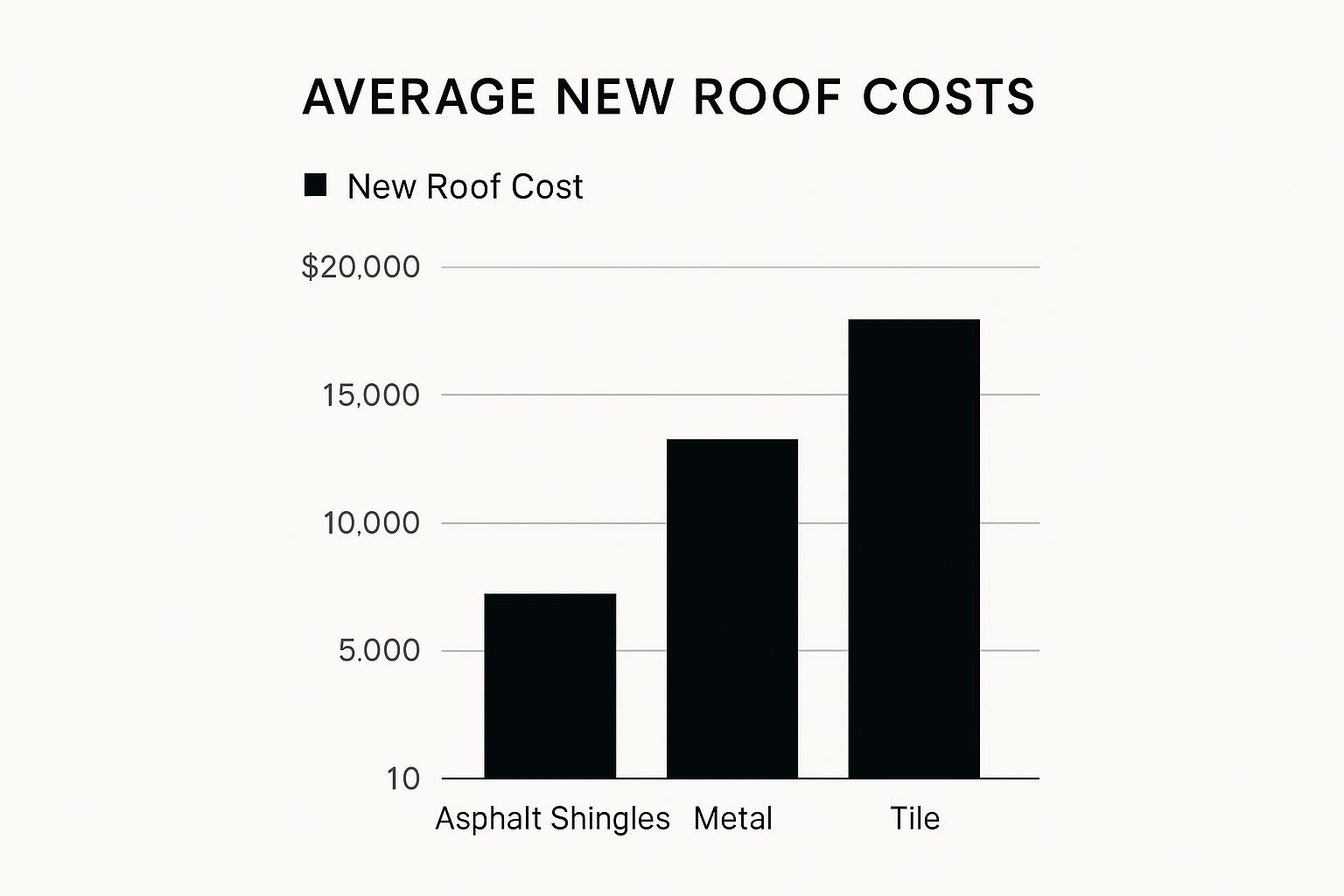
As the chart shows, there’s a clear link between the upfront cost and the long-term value you get from each material.
At Evershield Roofing, we see our job as helping you understand these trade-offs. We don’t just throw prices at you; we talk you through the long-term benefits of each option, making sure the material you choose is the perfect fit for your home, your budget, and your future.
Modern Flat Roofing Solutions
Flat roofs—common on extensions, garages, and dormers—need a completely different approach. The materials here are all about creating a seamless, waterproof barrier. Thankfully, modern flat roofing technology has come a long way, offering incredibly reliable and long-lasting options.
The price for a flat roof replacement in the UK mainly boils down to the material. For instance, you could be looking at £50-£90 per square metre for felt, £80-£120 for EPDM rubber, or £90-£130 for GRP fibreglass, all fully installed. These figures reflect the material's cost, how complex it is to install, and its expected lifespan. A felt roof might last 10-15 years, whereas a GRP system offers far greater durability. You can find more details on the benefits of different flat roofing materials.
These are the top choices we work with every day:
- Torch-on Felt: This is a proven, budget-friendly method. Modern systems use multiple layers of high-performance felt, heat-welded together to create a tough, watertight seal. It's a solid performer with a typical lifespan of 10-20 years.
- EPDM Rubber: Think of this as a custom-made rubber blanket for your roof. It’s laid down as one large, seamless sheet, making leaks extremely unlikely. It’s highly durable, flexible, and handles temperature swings with ease, giving it a lifespan of 20-30 years.
- GRP Fibreglass: For a top-tier, modern finish, Glass Reinforced Plastic (GRP) is the way to go. It creates a hard, seamless, and completely waterproof shell over your roof. It's incredibly tough, can be finished in different colours, and will comfortably last for 25+ years with next to no upkeep.
UK Roofing Material Comparison Cost vs Lifespan
We know that weighing up cost against lifespan can feel complicated. To make it simpler, we’ve put together this head-to-head comparison table. It clearly lays out how the new roof cost per square metre lines up with the expected lifespan for each material, helping you see which option represents the smartest long-term investment for your home.
| Material | Average Cost per m² (Installed) | Estimated Lifespan | Best For |
|---|---|---|---|
| Concrete Tiles | £90 – £170 | 30-50 Years | A versatile and budget-conscious choice for most modern homes. |
| Clay Tiles | £110 – £200 | 50-60+ Years | Creating a traditional, premium look with excellent longevity. |
| Natural Slate | £120 – £250+ | 100+ Years | Period properties or homeowners seeking maximum durability and kerb appeal. |
| Felt (Flat Roof) | £50 – £90 | 10-20 Years | Cost-effective solutions for garages, sheds, and smaller extensions. |
| GRP (Flat Roof) | £90 – £130 | 25+ Years | A robust, seamless, and low-maintenance finish for any flat roof. |
Ultimately, choosing the right material is a pivotal decision. By properly understanding the balance between what you pay today and how the roof will perform over time, you can confidently select an option that not only protects your home for decades but also perfectly suits your budget.
Budgeting for Labour and Other Essentials

Picking out the perfect tiles is the exciting part, but it's really just one piece of the puzzle when you're figuring out the total cost of a new roof. To get a realistic budget, you need to look beyond the materials and understand the other essential expenses that go into a professional job. These aren't 'hidden costs'—they're the fundamental building blocks of a safe, durable, and properly installed roof.
The biggest of these, by far, is labour. It's the skill and hard work of experienced roofers that turns a pile of materials into a weatherproof shield for your home. This is a craft, and it takes experience, precision, and a serious amount of know-how.
Understanding Labour Costs
Labour isn't just a single number pulled out of thin air; it’s directly tied to the unique demands of your specific roof. The more complex the job, the more time and expertise it needs, and that will be reflected in the quote.
A few key things will influence the labour portion of your bill:
- Project Duration: A simple terraced house roof might be done in a few days. A large, complex roof on a detached home with multiple angles could easily take a week or more.
- Crew Size: More complex projects naturally need more hands on deck to get the work done safely and on schedule.
- Roof Complexity: As we’ve mentioned, things like dormer windows, valleys, and chimneys are far more time-consuming to work around than a simple, straight run of tiles.
At Evershield Roofing, we make sure our quotes give you a clear breakdown of the labour involved. Our trained technicians work efficiently, but we believe in being completely transparent about how their time contributes to the final cost.
The Essential On-Site Overheads
Aside from the roofing materials and the team putting them on, every professional job has a few critical overheads. These are non-negotiable for safety, legal compliance, and just being a responsible contractor.
Think of it like cooking a big Sunday roast. You've got the ingredients (your tiles) and the chef (the roofer). But you also need the oven, the roasting tins, and the energy to power it all, not to mention a plan for the washing up. These overheads are the essential equipment and services for your roofing project.
Any comprehensive quote should include:
- Scaffolding Hire: This is an absolute must-have for safety on almost every single re-roofing project. A proper scaffold provides a stable platform for our team and protects you, your family, your property, and the public.
- Skip Hire: Tearing off an old roof creates a surprising amount of waste – old tiles, felt, battens, you name it. A dedicated skip is the only responsible way to manage it all.
- Waste Removal: This covers the cost of having all the old materials taken away and disposed of in an environmentally sound manner.
Planning for Potential Extras
Every so often, stripping off the old roof can reveal issues that were impossible to spot during the initial inspection. While we always do our best to give you a complete quote from the start, it’s sensible to be aware of potential extras that might be needed to give your new roof a solid foundation.
This is where dealing with a trustworthy company like Evershield Roofing really pays off. If we find something unexpected, we stop. We’ll show you exactly what the problem is and give you a clear, separate quote for the additional work before we go any further. Common discoveries include:
- Rotten Timber: If the underlying battens or even the roof deck have been damaged by a long-term leak, they have to be replaced.
- Insulation Upgrades: Current building regulations often mean you'll need to improve insulation levels when replacing a roof, which will make your home more energy-efficient.
- New Fascias and Soffits: While the scaffolding is up, it's often the most cost-effective time to replace tired or damaged fascias, soffits, and guttering.
Getting your head around these other essentials is the key to creating an accurate budget for your new roof and avoiding any unwelcome surprises down the line.
A Practical Example: New Roof on a UK Semi-Detached House
Ever wondered why a new roof in London might cost a fair bit more than the exact same job in Liverpool? It’s a classic case of postcode lottery. Where your property is located plays a surprisingly big part in the final bill for a new roof, a factor that often catches homeowners by surprise. Let's put this into a real-world context with a typical UK property.
A Tale of Two Terraced Houses
Imagine we're replacing the roof on a standard three-bedroom terraced house in Buckinghamshire. The roof is a simple gable design, about 60m², and in reasonable structural shape. The homeowner wants a durable, cost-effective solution and opts for standard concrete tiles.
Here’s a breakdown of what a quote from Evershield Roofing would look like:
| Item | Description | Estimated Cost |
|---|---|---|
| Materials | Concrete tiles, battens, breathable membrane, fixings, ridge/hip tiles. | £1,800 – £2,500 |
| Labour | A team of 2-3 certified roofers for 3-4 days. | £1,500 – £2,200 |
| Scaffolding | Full scaffold erection and hire for the duration of the job. | £800 – £1,200 |
| Waste Disposal | Skip hire and responsible removal of all old materials. | £300 – £500 |
| Subtotal | £4,400 – £6,400 | |
| VAT @ 20% | £880 – £1,280 | |
| Total Estimated Cost | £5,280 – £7,680 |
This example highlights that the final new roof cost is a sum of its parts. If this same house was located in Central London, the labour and scaffolding costs could be 20-30% higher due to increased overheads. If the homeowner chose premium natural slate instead of concrete, the material cost could more than double. This is why a "one-size-fits-all" price just doesn't work. For more on how location affects smaller jobs, our guide to understanding flat roof repair costs provides extra insight.
Understanding these regional and material variations is key. That's why at Evershield Roofing, we always carry out a detailed, on-site survey. It’s the only way to give you a precise quote that reflects genuine local material costs and labour rates, ensuring there are no nasty surprises.
Ready for a Quote You Can Trust?
Now that you have a better idea of what goes into the cost of a new roof, the next step is to get a clear, accurate price for your own home. This is where we come in, making the whole process as straightforward and transparent as possible.
At Evershield Roofing, we kick things off with a friendly, no-obligation chat. We don’t believe in guesswork or ballpark figures over the phone. Instead, we’ll arrange a thorough, on-site inspection of your roof to see exactly what’s needed, from its current condition to the best materials for your property and budget.
Our Clear and Honest Quoting Process
After our visit, we’ll put together a detailed, itemised quotation. We pride ourselves on total clarity. You won’t find any confusing jargon or hidden extras, just a simple breakdown showing you precisely what you’re paying for.
Here’s what you can always expect from us:
- Top-Quality Materials: We only use durable, proven materials from trusted UK suppliers. Your new roof needs to stand the test of time, and we build it to do just that.
- Certified Professionals: Our team is made up of experienced, fully certified roofers who are true masters of their trade.
- Guaranteed Workmanship: We stand firmly behind our work, ensuring every single job not only meets all UK building regulations but also our own demanding standards.
We blend our local Buckinghamshire expertise with an unshakable guarantee of quality. When you get a quote from Evershield Roofing, you're getting more than just a number—you're getting a promise of reliability and professionalism from a team that truly knows roofing.
Your Next Step
Choosing the right people for the job is just as critical as choosing the right tiles. For more tips, have a look at our guide on choosing the right contractor for your new roof, which has some great questions you should ask any roofer.
Ready to find out exactly what a new roof will cost for your home? Get in touch today to arrange your free, in-depth survey and receive your personalised quote.
Frequently Asked Questions About Roofing Costs
Once you start digging into what a new roof might cost, you’ll probably find that one question leads to another. It’s completely normal. To help you get a clearer picture, we’ve put together some straightforward answers to the questions we hear most often from UK homeowners.
How Long Does a Full Roof Replacement Take?
For a typical semi-detached house, you can expect the entire re-roofing job to take somewhere between 3 and 5 working days. Think of this as a baseline, though, because a few things can easily stretch the timeline.
The biggest wildcard is always the good old British weather. We simply can’t work safely in heavy rain or high winds, so that can cause delays. Another common issue is discovering unexpected problems once the old roof is off, like rotten timber joists that need replacing. Of course, a more complex roof design with lots of valleys or dormer windows will naturally take more time than a simple, straight-up gable roof.
Do I Need Planning Permission for a New Roof?
For most re-roofing projects, the answer is no. As long as you're replacing the old materials with something that looks similar, it usually falls under 'permitted development', so you don't need planning permission.
However, there are some big exceptions to be aware of. If your home is a listed building, or if you live in a Conservation Area or National Park, you will almost certainly need to get the green light from your local authority. The same goes for any major alterations, like changing the shape of the roof or adding new rooflights. When in doubt, a quick call to your local council is always the safest bet.
The national average replacement cost sits around £7,000, but that figure can swing dramatically based on your roof’s design. For example, the more complex hip roofs usually land somewhere between £9,250 and £18,000. Simpler gable roofs are a bit easier on the wallet, ranging from £7,000 to £16,250, while flat roofs are the most affordable, typically costing £2,800 to £7,500. You can explore more detailed cost breakdowns to see how these figures add up.
Is It Cheaper to Repair or Replace My Roof?
If you’ve just got one or two slipped tiles or a tiny leak near a flashing, a simple repair is absolutely the cheaper option. It makes no sense to replace a whole roof for a minor, isolated problem.
But, if your roof is getting on a bit—say, over 20-25 years old—and you're constantly calling someone out for patch-up jobs, a full replacement is the much wiser investment. While the upfront new roof cost is obviously higher, it buys you total peace of mind for decades to come. A new roof also boosts your home's energy efficiency and can seriously increase its market value. Pouring money into endless small repairs on a failing roof is often just throwing good money after bad.
Ready to get a clear, no-nonsense answer for your own roofing project? Contact Evershield Roofing today. We can schedule a free, in-depth survey and provide a personalised quote you can rely on. Find out more by visiting us at https://www.evershieldroofing.co.uk.

